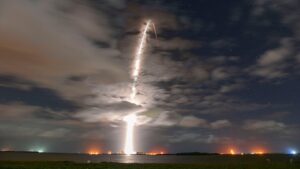SpaceX sets new Falcon 9 reuse milestone on Starlink launch
By Jeff Foust

WASHINGTON — SpaceX set a new milestone in Falcon 9 reuse with the latest Starlink satellite launch Nov. 24 as the company seeks permission to deploy Starlink satellites into a new orbit.
The Falcon 9 rocket lifted off from Space Launch Complex 40 at Cape Canaveral Air Force Station in Florida at 9:13 p.m. Eastern. The rocket’s upper stage released its payload of 60 Starlink satellites into low Earth orbit about 15 minutes later.
The rocket’s first stage landed on a droneship in the Atlantic, completing its record-setting seventh launch. The stage first flew in September 2018 launching the Telstar 18 Vantage satellite, followed by the final Iridium mission in January 2019. The rocket then launched four Starlink missions starting in May 2019, most recently Aug. 18.
The launch was also the 100th overall for the Falcon 9, a total that includes a June 2015 launch failure but not the destruction of another on the pad during preparations for a static-fire test in September 2016.
SpaceX has now launched 955 Starlink satellites, of which 895 are in orbit. The company has started a beta test of the broadband internet service provided by those satellites in the northern U.S. and southern Canada. During the webcast of this launch, the company said it would expand that beta test “in a notable way” in late January or early February.
To date SpaceX has launched Starlink satellites into orbits at an inclination of 53 degrees, maximizing coverage over mid-latitude regions but excluding higher latitudes, including Alaska, northern Canada and northern Europe. The company’s original authorization from the Federal Communications Commission called for other satellites at higher orbits and inclinations, but the company filed a proposed modification in April that would lower all the satellites into orbits between 540 and 570 kilometers, including those in high-inclination orbits.
In a Nov. 17 filing with the FCC, SpaceX sought permission to start launching satellites into sun-synchronous orbit. It requested permission to launch 58 satellites into one of six orbital planes at an inclination of 97.6 degrees as soon as December, arguing that doing so would allow the company to begin to provide broadband service in rural Alaska.
“SpaceX submits this request now because it has an opportunity for a polar launch in December that could be used to initiate its service to some of the most remote regions of the country,” the company stated in the filing, arguing that “launching to polar orbits will enable SpaceX to bring the same high-quality broadband service to the most remote areas of Alaska that other Americans have come to depend upon, especially as the pandemic limits opportunities for in-person contact.”
The company didn’t elaborate on the details of this launch opportunity, but claimed that its request was justified because it had resolved a concern with Amazon about a potential conflict with that company’s proposed Project Kuiper constellation. SpaceX agreed to tighten the orbital tolerances on the Starlink satellites at 570 kilometers such that they would not fly higher than 580 kilometers, avoiding Kuiper satellites at 590 kilometers.
Another satellite operator, though, objected to SpaceX’s proposal. “But commercial expediency is hardly a valid reason for the Commission to bypass the requirements of the Communications Act and grant an application prematurely, in the face of significant doubts as to whether SpaceX has met the public interest standard,” countered Viasat in a Nov. 19 FCC filing.
Viasat, which has criticized the reliability of Starlink satellites in earlier filings, again raised concerns about premature failures of Starlink satellites. It noted there was no evidence the December launch opportunity was the only one for those satellites, particularly since SpaceX controls the launches.
“The Commission should balk at SpaceX’s request to provide it with additional authority that it does not yet need when doing so could endanger orbital safety,” it stated. The FCC has yet to act on SpaceX’s request for the polar launch.
November 25, 2020 at 08:57AM
via SpaceNews read more...

Post a Comment